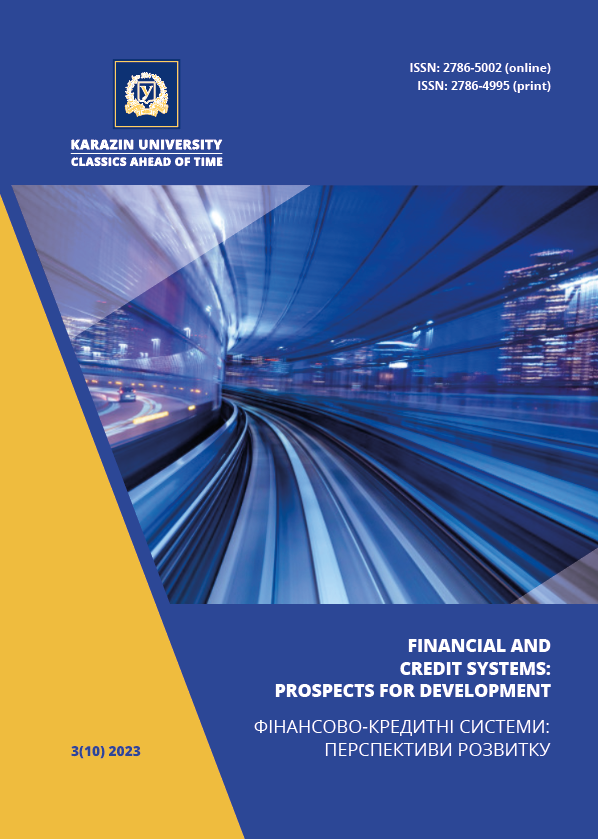Econometric forecasting of academic management in the face of uncertainty regarding hostilities
Abstract
This article addresses the problem of interrelations between economic factors and military conflicts, examining the role of econometric forecasting in the context of academic management during periods of uncertainty surrounding hostilities. It delves into the two principal theories of classical macroeconomics – neutrality and dichotomy – and explores their applicability to the complex interplay between economic forces and military dynamics. In doing so, it challenges the conventional binary view of conflicts as either war or peace, emphasizing the nuanced gradations that emerge over time.
The study highlights the significance of economic advantages in shaping decisions related to military conflicts and underscores the role of econometric forecasting as a critical factor in academic institutions navigating the indirect repercussions of hostilities. The article also presents a comprehensive examination of strategic interactions, introducing distinctions between moves, rounds, and plays in conflict scenarios.
Drawing on recent research and publications, the article underscores the importance of understanding the economic principles governing the preservation of peace and forecasting the consequences of such decisions. It references seminal work by economists P. Romer, R. Lucas, R. Barro, I. Salla y Martin, and R. Levine, who laid the foundation for the study of endogenous economic development.
The theories of trade and military conflict are two distinct branches in economic analysis and prediction. Trade theory is founded on contractual agreements and mutual benefits, while the military conflict theory centers on competition for dominance. It's important to recognize that various analytical methods exist for modeling equilibrium in such situations, whether they involve active hostilities or the coexistence of armed forces during economic stagnation due to anticipated conflicts.
It becomes evident that the decision to initiate or de-escalate a military conflict is primarily driven by economic advantages, even in the domain of academic management. In this context, econometric forecasting techniques play a role in the economic activities of academic institutions, which may experience direct or indirect consequences of hostilities. This is because various sectors must compete for their survival amidst these dynamics.
Purpose. The study's objectives include assessing the impact of military budgeting productivity on economic growth using economic and mathematical modeling techniques, with a focus on countries facing uncertainties related to hostilities, evolving budget and tax regulations, and inflation. The article adapts the models of J. Battis and T. Koeli to facilitate this analysis.
Methods Macroeconomic Analyses, Economentric Analyses, Trend Analyses
Results. Determining the optimal level of taxation to obtain the necessary income for the budgets of academic institutions in conditions of uncertainty in the conduct of hostilities.
In conclusion, the study challenges classical economic doctrines by establishing a strong connection between military budget allocation and the real sectors of the economy. It underscores that a nation's economic growth is contingent upon the productivity and effectiveness of its military budgeting, even in a globalized world economic system. This study opens the door to further research in this interdisciplinary field.
Keywords: Econometric forecasting, Academic management, Uncertainty, Hostilities, Economic modeling, Endogenous economic development, Academic institutions, Budgeting, Military conflicts, Financial impact, Economic growth, Strategic decision-making, Budget optimization, Risk assessment, Financial efficiency. Methods Macroeconomic Analyses, Economentric Analyses, Trend Analyses
fig .: ; tab .: ; bibl .: 9.
Downloads
References
Jiang, Y., & Gu, J. (2022). Technology and Economic Growth. In Technology and Industrial Transformation of China (pp. 21-44). Singapore: Springer Nature Singapore.
Suntsova, O. (2022). ECONOMETRIC AND DIGITAL BUSINESS TRANSFORMATION IN INDUSTRY 4.0 AND 5.0 CONCEPTS. Financial and credit systems: prospects for development, 2(5), 36-47. https://www.researchgate.net/publication/366953493_ECONOMETRIC_AND_DIGITAL_BUSINESS_TRANSFORMATION_IN_INDUSTRY_40_AND_50_CONCEPTS
Cao, X., Kannaiah, D., Ye, L., Khan, J., Shabbir, M. S., Bilal, K., & Tabash, M. I. (2022). Does sustainable environmental agenda matter in the era of globalization? The relationship among financial development, energy consumption, and sustainable environmental-economic growth. Environmental Science and Pollution Research, 29(21), 30808-30818.
Ozturk, I., & Ullah, S. (2022). Does digital financial inclusion matter for economic growth and environmental sustainability in OBRI economies? An empirical analysis. Resources, Conservation and Recycling, 185, 106489.
Cao, J., Law, S. H., Samad, A. R. B. A., Mohamad, W. N. B. W., Wang, J., & Yang, X. (2022). Effect of financial development and technological innovation on green growth—Analysis based on spatial Durbin model. Journal of Cleaner Production, 365, 132865.
Nasir, M. A., Canh, N. P., & Le, T. N. L. (2021). Environmental degradation & role of financialisation, economic development, industrialisation and trade liberalisation. Journal of Environmental Management, 277, 111471.
Suntsova O.O. (2023) Econometric Forecasting of Socio-Economic Processes in a Globalized World Amidst Military Uncertainty Financial Space of Ukraine in the Context of Globalization and Deglobalization Transformations: Monograph / Edited by Dr. Sc. in Economics, Professor, Distinguished Scientist of Ukraine S. V. Onyshko. – Irpin : State Tax University. P. 126-158 DOI: 10.5281/zenodo.8386114 available at https://zenodo.org/record/8386114
Suntsova O.O. (2022) ASSESSMENT OF THE IMPACT OF FINANCIAL TECHNOLOGIES AND VIRTUAL ASSETS ON ECONOMIC GROWTH OF THE COUNTRY BUSINESS, INNOVATIONS, MANAGEMENT: PROBLEMS AND PROSPECTS. pp. 139-140 DOI: 10.5281/zenodo.7556751 available at http://confmanagement.kpi.ua/proc/article/view/271927/267573 https://www.researchgate.net/publication/367310698_OCINUVANNA_VPLIVU_FINANSOVIH_TEHNOLOGIJ_TA_VIRTUALNIH_AKTIVIV_NA_EKONOMICNE_ZROSTANNA_KRAINI
Suntsova O. (2022) The Impact of Digital Business Assets and Financial Technologies on the Economic Growth of the Country. Market Infrastructure. 68, рр. 254-260 DOI: https://doi.org/10.32843/infrastruct68-44 available at http://www.market-infr.od.ua/journals/2022/68_2022/46.pdf
Citations
Strategic Risk Management and Organizational Adaptation in National Security: Leveraging Artificial Intelligence in Times of Global Instability
Suntsova Olesia (2025) SSRN Electronic Journal
Crossref
Copyright (c) 2023 Financial and credit systems: prospects for development

This work is licensed under a Creative Commons Attribution 4.0 International License.

